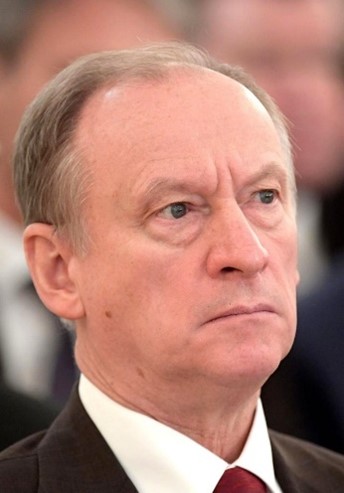
Russian Security Council Secretary Nikolai Patrushev.
“The Secretary of the Security Council of the Russian Federation also stressed that ‘Russia and Iran today are at the forefront of the struggle for the establishment of a multipolar world order.’”
A major tenet of the Kremlin’s current ideology revolves around transforming what it perceives as a U.S.-led global security sphere into a multipolar world order where Russia occupies one of the key poles. The Kremlin promotes this ideology globally, especially to countries that have had a troubled relationship with the United States, and Russia has increased these efforts since its invasion of Ukraine began. The accompanying excerpt from the pro-business site Kommersant describes the recent visit of Russian Security Council Secretary Nikolai Patrushev to Tehran on 9 November, where he claimed, “Russia and Iran today are at the forefront of the struggle for the establishment of a multipolar world order.” During Patrushev’s visit, the two sides “discussed all aspects of bilateral cooperation, from the economy to security,” in light of improving bilateral relations over the past decade.[i] The author suggests that the two countries traded notes regarding “the survival of the economy under sanctions, cybersecurity, terrorism, as well as the interference of external forces in the internal affairs of Russia and Iran.” The latter point was emphasized by Patrushev, who “noted the key role that Western intelligence services have played in organizing mass riots in Iran and the subsequent dissemination of disinformation about the situation in the country.”
Since the Kremlin officially denies receiving military assistance from Iran, the article carefully cites foreign reports on “the supply of Iranian drones to Russia for use in hostilities in Ukraine.” For the Kremlin and the wider Russian audience, admitting the need for Iranian military technology would be regarded as humiliating. Not that long ago, it was Iran who requested Russian military assistance, and now the tables have turned.[ii] The article concludes by asserting that increased Western pressure on Iran will likely result in “closer cooperation between Russia and Iran.”
Source:
Marianna Belenkaya, “Совбезы РФ и Ирана поговорили на одном языке (Security Councils of Russia and Iran spoke the same language),” Kommersant (pro-business news outlet), 9 November 2022. https://www.kommersant.ru/amp/5653639
Russia and Iran held interdepartmental consultations on security issues in Tehran on Wednesday (9 Nov). The Russian delegation was led by Secretary of the Security Council of the Russian Federation Nikolai Patrushev. In the Iranian capital, he was received by Iranian President Ebrahim Raisi. According to official reports, the meeting discussed various issues of Russian-Iranian cooperation in the field of security, as well as a number of international problems….
The two countries have accumulated a lot of common themes, or rather, common problems. Among them are the survival of the economy under sanctions, cybersecurity, terrorism, as well as the interference of external forces in the internal affairs of Russia and Iran.
Iranian politicians do not need to explain anything to their Russian colleagues. They understand everything themselves, moreover, they speak the same language. Thus, at a meeting with an Iranian colleague, Nikolai Patrushev noted “the key role of Western intelligence services in organizing mass riots in Iran and the subsequent dissemination of disinformation about the situation in the country based on the Persian-language Western media controlled by them.” …The Secretary of the Security Council of the Russian Federation also stressed that “Russia and Iran today are at the forefront of the struggle for the establishment of a multipolar world order” and this “is confirmed by the unprecedented pressure on our countries from Washington and its satellites.”
…From the very beginning of hostilities in Ukraine, Tehran stated that they understood Russian security concerns and believed that the conflict between Moscow and Kyiv was provoked by NATO… The atmosphere in Iranian-Ukrainian relations escalated after the media reported on the supply of Iranian drones to Russia for use in hostilities in Ukraine….
… Against this background, experts believe that the stronger the pressure of the West on Iran, including in the form of strengthening the sanctions regime, and the more elusive the chance to restore the “nuclear deal” becomes, the closer cooperation between Russia and Iran will become.
Notes:
[i] For additional background on Russian-Iran relations, see Ray Finch, “Russian Views of Iran,” Review of Persidskij bastion (Persian Bastion) in NATO Defense Review, edited by R. N. Pukhov and Yu. Yu. Lyamin, Moscow, CAST, 2019, 320pp. https://www.ndc.nato.int/research/research.php?icode=668
[ii] For additional background on Russian arms sales to Iran, see Ray Finch, “Russian Arms Sales to Iran,” OE Watch, July 2020. https://community.apan.org/wg/tradoc-g2/fmso/m/oe-watch-articles-2-singular-format/365980
Image Information:
Image: Russian Security Council Secretary Nikolai Patrushev
Source: https://commons.wikimedia.org/wiki/File:Patrushev_NP.jpg
Attribution: CCA 4.0 Intl
